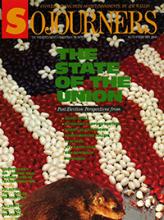SINCE GEORGE BUSH IS not going to be served up many drug "kingpins" (why are these sinister fellows always bowling objects?) for execution at the White House, one wonders how he will fill his days. No doubt, a day spent not raising taxes is a day well spent in Bush's mind; but it does leave time on one's hands. He has mainly told us what things he will not do as president--which, happily for his record of keeping promises, are largely things he cannot do anyway (like furlough state offenders).
It may be hard to keep track of what he is doing (as it has been during his tenure as vice president). George Bush is, after all, the first CIA director (or even operative) to become president--a development far more dubious than the election of a military general. Eisenhower had a clear notion of civil control over the military. But the CIA is meant to circumvent that clarity of subordination.
Bush was not only a spymaster himself. He likes the type. He attracts and nurtures them, as he welcomed Oliver North to his Christmas party after the revelations of North's clandestine activities. President Reagan may spare his successor the job of pardoning North; but how is Bush to discourage aspiring Norths in his administration, assuming he might want to do that after the experience of the Iran-contra actions? He seems to take his grandfatherly acquisition of some "brown ones" to mean that he should care for the contras, a matter even Reagan could not persuade the American people to pursue through legal channels.
The trouble with having an espionage aficionado as president is that espionage, though designed to make society more secure, through knowledge of an enemy's condition, tends to make it feel less secure, by inflating the enemy's intent. A "worst-case scenario" becomes the only safe assumption--which leaves the country always on the edge of direst peril.
Read the Full Article

